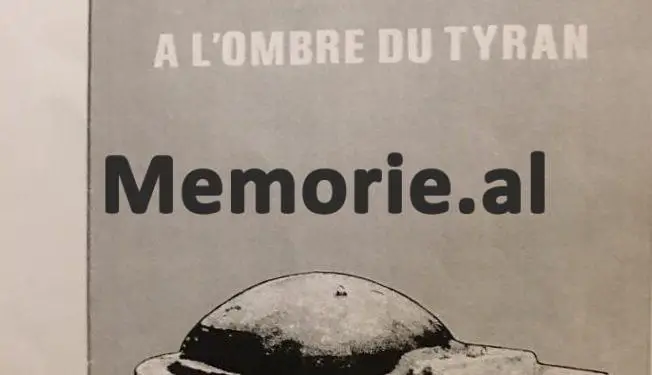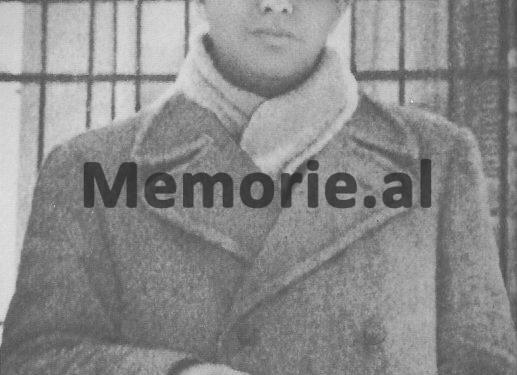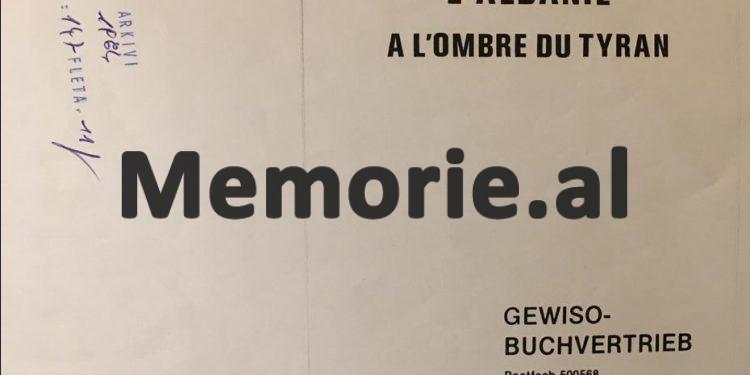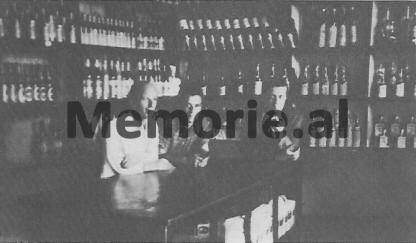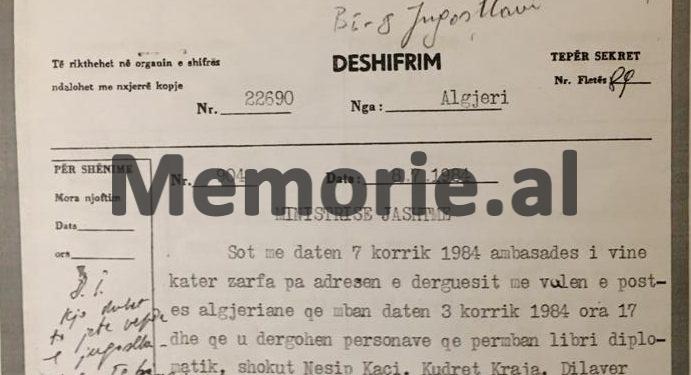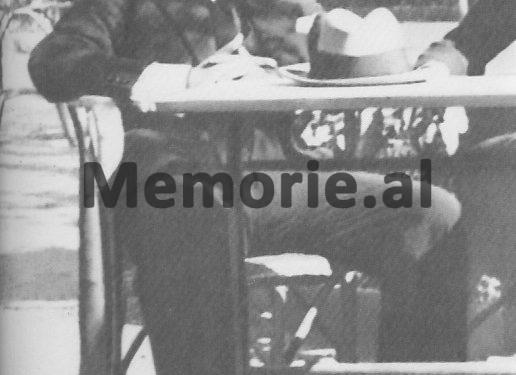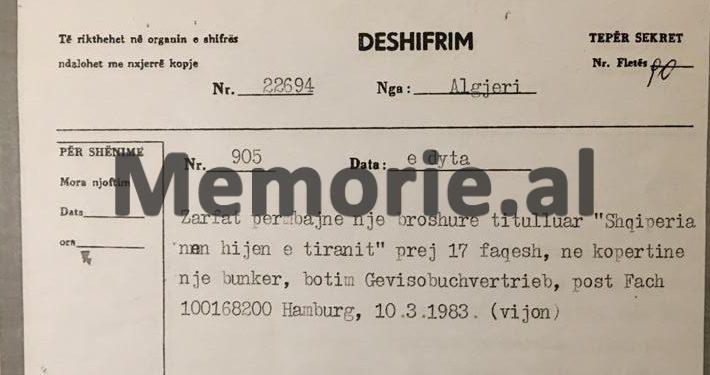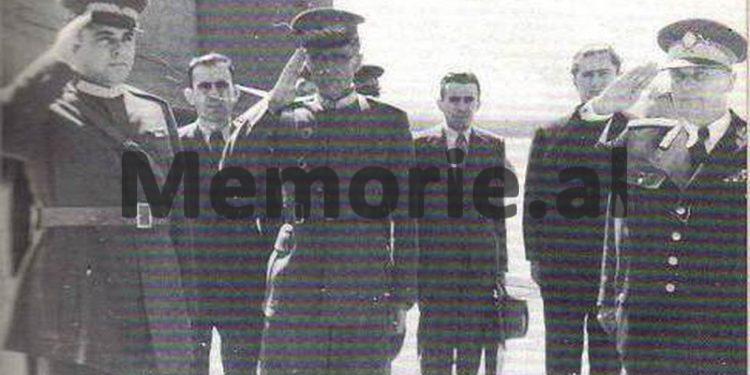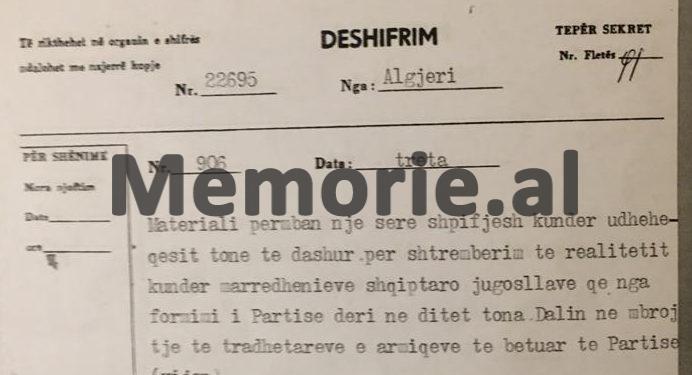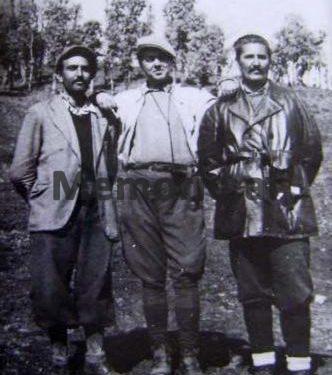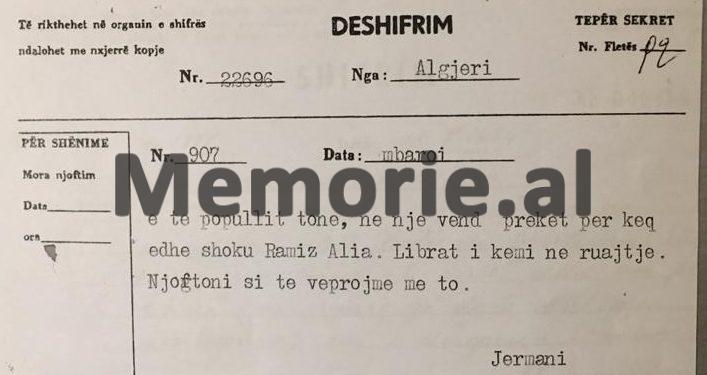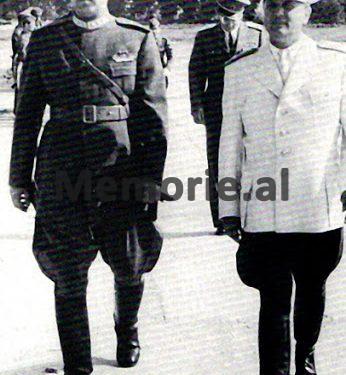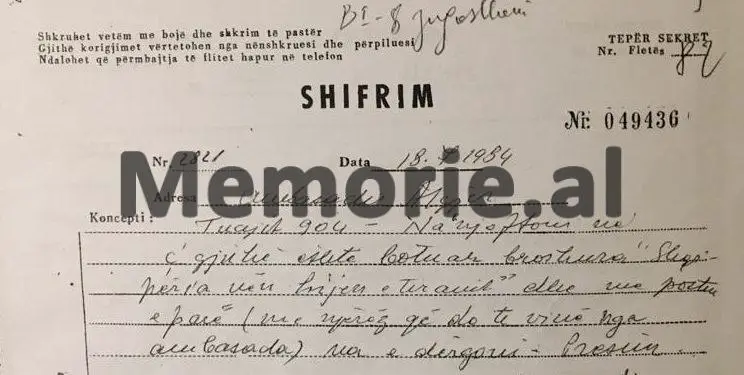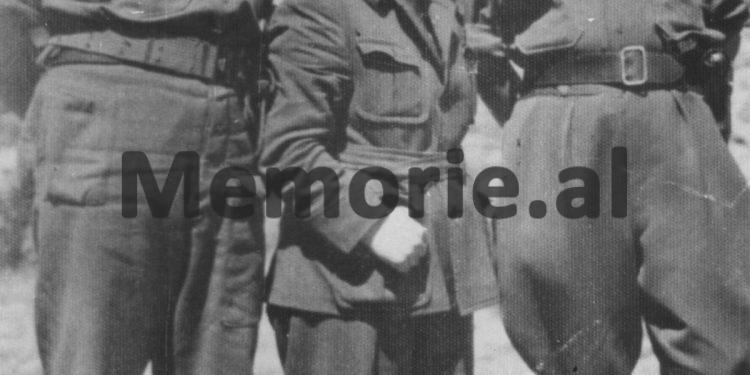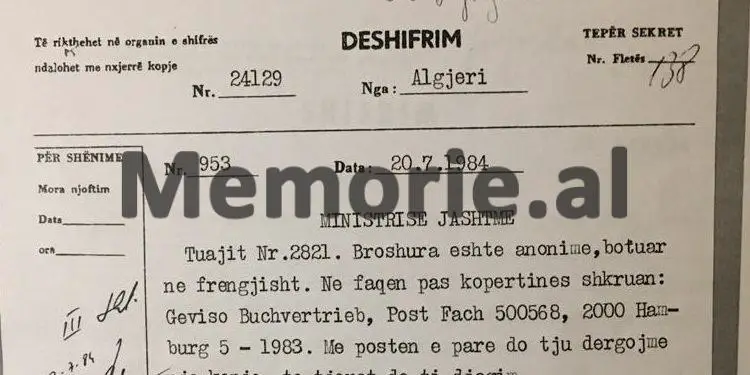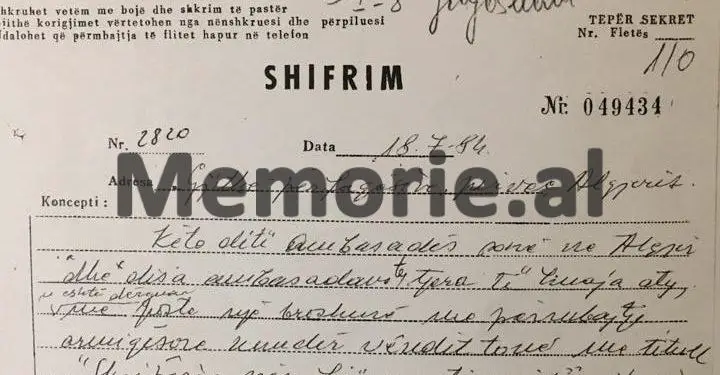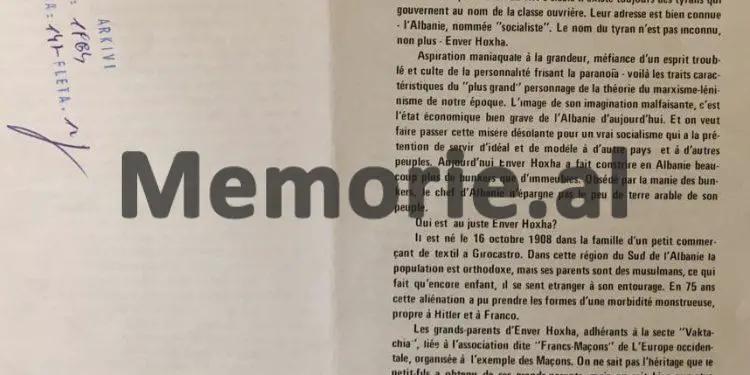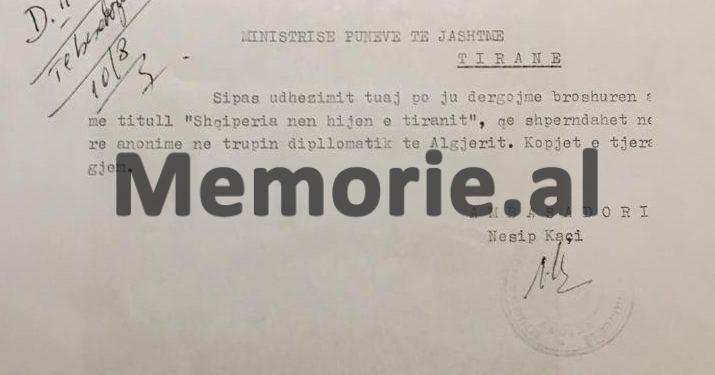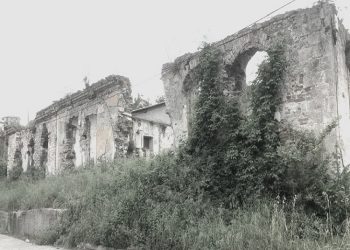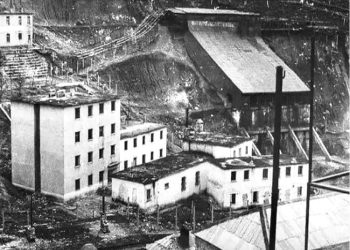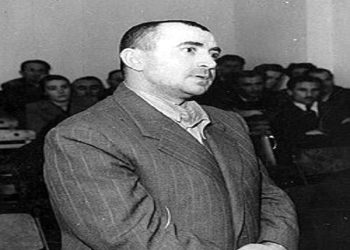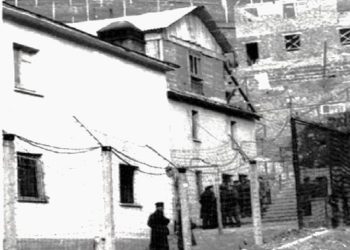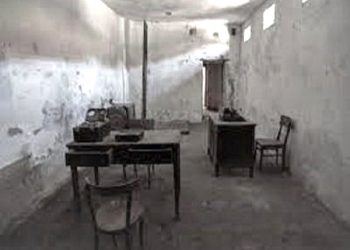Dashnor Kaloçi
Memorie.al publishes some archival documents extracted from the Archive of the Ministry of Foreign Affairs in Tirana with the initials “To top secret”, where there is a correspondence between the Albanian Embassy in Algeria and the Ministry of Foreign Affairs in Tirana, dated July 7, 1984. , where Ambassador Nesip Kaçi informs his superiors about a book (brochure) in French, entitled “Albania under the shadow of a tyrant”, which was sent to that embassy by mail. The brochure in question, which was mailed to several other foreign embassies accredited in Algeria, talks about the life and political activity of the Albanian communist leader, Enver Hoxha, from the origin of the family, until then (1983 ), that book has been published.
“Today, on July 7, 1984, four envelopes come to the embassy without the sender’s address with the stamp of the Algerian post office dated July 3, 1984 at 15.00, which are sent to persons containing the diplomatic book, comrade Nesip Kaçi, Kudret Kraja, Dilaver Shkurti, and Jonuz Çiraku. The envelopes contain a 17-page pamphlet entitled “Albania under the shadow of the tyrant”, on the cover of a bunker, published by Gevisobuchvertieb, post Fach 100168200 Hamburg 10.3.1983. The material contains a series of slanders against our beloved leader for distorting the reality against the Albanian-Yugoslav Yugoslav relations from the formation of the Party to the present day. They come out in defense of the traitors and sworn enemies of the Party. ” This was stated, among other things, in some telegrams with the initials “To top secret” that the Albanian embassy in Algeria sent to the Ministry of Foreign Affairs on July 7, 1984, which bears the signature of the ambassador, Nesip Kaçi. As we will see through these archival documents issued by the Archive of the Ministry of Foreign Affairs in Tirana, which bear the initials “Too Secret” (long declassified) and which are published for the first time by Memorie.al, in The correspondence in question between our diplomatic mission in Algeria and the Ministry of Foreign Affairs in Tirana, is about a book (brochure) in French, which was sent to that embassy by mail. The pamphlet in question, entitled “Albania under the shadow of a tyrant”, which has been mailed to several other foreign embassies accredited in Algeria, talks about the life and political activity of the Albanian dictator, Enver Hoxha, since the origin of family, until that time (1983), when that booklet was published. From its contents, it seems that it was published and distributed by the Yugoslav secret services of that time, UDBA (which is also “confirmed” by the heads of the Albanian embassy in Algeria) and it contains a chronological exposition of the Albanian communist leader, Enver Hoxha, with a series of accusations, starting from: his daughter in France during the period of the Zog Monarchy, (where it is alluded or more precisely accused that he was sent by the secret police of the Monarchy), his activity in France, journalistic writings under the pseudonym, “Lulo Malësori”, return to Albania and work as a professor at the French Lyceum of Korça, coming to the helm of the Albanian Communist Party with the help of Yugoslavs, Berat Plenum where he escaped dismissal, friendship and breakup with Yugoslavia and Joseph Broz Tito, then Stalin’s Soviet Union, and Mao Zedong’s China, the iron-clad handling of his close associates and his political opponents, his vices and paranoia. and to the miserable condition where he had turned his country, which he had ruled with an iron fist since 1944. Furthermore, we know the book in question, which Memorie.al publishes in full and with facsimiles. relevant, as located in the Archive of the Ministry of Foreign Affairs in Tirana.
DESIGN Very Secret
No. 904 By Algeria
Date: 8.7.1984
MINISTRY OF FOREIGN AFFAIRS
Today, July 7, 1984, four envelopes arrive at the embassy without the sender’s address with the stamp of the Algerian post office dated July 3, 1984 at 3 pm and sent to persons containing the diplomatic book, Comrade Nesip Kaçi, Kudret Kraja, Dilaver Shkurti, and Jonuz Çiraku. (Continued)
DESIGN Very Secret
Nr. 905 By Algeria
Date: second
The envelopes contain a 17-page pamphlet entitled “Albania under the shadow of the tyrant”, on the cover of a bunker, published by Gevisobuchvertieb, post Fach 100168200 Hamburg 10.3.1983. (Continued)
DESIGN Very Secret
No. 906 By Algeria
Date: third
The material contains a series of slanders against our beloved leader for distorting the reality against the Albanian-Yugoslav Yugoslav relations from the formation of the Party to the present day. They come out in defense of the traitors and sworn enemies of the Party. (Continued)
DESIGN Very Secret
Nr. 907 From Algeria
Date: it’s over
Comrade Ramiz Alia is also badly affected by our people in one place. We have the books in storage. Let us know how to deal with them.
Jermani
Extremely INSURANCE
Nr. 2821
Date: 18.7.1984.
Address: Embassy in Algiers
Concept: Let us know in what language it was published in the brochure “Albania under the shadow of the tyrant”, and send it to us by the first post (with people who will come from the embassy). We look forward to it.
Muhammad
07/19/1984
DEFINITION Extremely Secret
Nr.953
Date: 20.7.1984
MINISTRY OF FOREIGN AFFAIRS
Your No. 2821. The pamphlet is anonymous, published in French. The cover says: Geviso Buchvertrieb, Post Fach 500568, 2000 Hamburg 5 – 1983. With the first post we will send you a copy, we will burn the others.
Nesipi
Top Secret
coding
Nr. 2820
Date: 18.7.1984
Address. All representations except Algeria
Concept: These days, our embassy, in Algeria, and some other foreign embassies there, have been sent by mail, a brochure with hostile content against our country entitled “Albania, under the shadow of the tyrant.” Let us know if you have been notified, or if you have been notified by a representative.
Embassy of the People’s Republic
Socialist of Albania
Algeria Top Secret
No.73
MINISTRY OF FOREIGN AFFAIRS
According to your instruction, we are sending you the brochure entitled “Albania, under the shadow of the tyrant”, which is being anonymously distributed to Alger’s diplomatic corps. We burned the other copies.
AMBASSADOR
Nesip Kaçi
Brochure “Albania under the shadow of the tyrant”
In Europe at the end of the twentieth century there are still “tyrants” who rule in the name of the working class. Their address is known – Albania, called “socialist”. The name of the tyrant is not unknown, no: Enver Hoxha.
Manic aspiration for greatness, distrust of a troubled spirit and personality bounded by paranoia – these are the hallmarks of the “greater” character of the Marxism-Leninism theory of our time. The image of his evil imagination is the very serious economic situation of Albania today. And we want to pass this disturbing misery to a real socialism that claims to serve as an ideal and a model for other countries and peoples. Enver Hoxha had many more bunkers than buildings in Albania today. Obsessed with bunker mania, the Albanian leader does not spare arable land from his people.
Who exactly is Enver Hoxha?
He was born on October 16, 1908 in the family of a small textile merchant in Gjirokastra. In this region of southern Albania, the population is Orthodox, but his parents are Muslim, which makes him feel like a stranger to those around him as children. In 75 years, this alienation has been able to take the form of a monstrous morbidity, peculiar to Hitler and France.
Enver Hoxha’s grandparents, members of the Bektashi sect, associated with the so-called Freemason Association of Western Europe, organized as Masons. We do not know the legacy that the grandson received from his grandparents, but we do know that he later destroyed 2,000 churches and mosques in Albania, including masterpieces of art, to demonstrate that there is only one God in the world and that God is it.
Enver Hoxha, “the spoiled child of the Masonic lodge”
“Leader” Enver Hoxha will never admit that he is the “spoiled child of the Masonic lodge” and although he is a high school student in Korça, he receives a state scholarship and, as a royal scholarship, studies botany in Monpellìer, France. As a student he was forced to give up his scholarship due to his poor success, but on the other hand, he did not break his ties with Zog’s agents and was soon appointed consul in the royal diplomatic mission in Brussels, Belgium. . This is where Enver Hoxha enrolled in law school, but again, he does not have the strength to complete his studies. Under the orders of the Albanian royal authorities, he left for Paris, where under the pseudonym “Lulo Malesori” Zog’s agents accused him of publishing articles in the French press, against the royal regime, in order to more easily penetrate among the progressive forces. Until 1936, Enver Hoxha “collaborated” with the progressive Albanian publications. The goal of the royal police is to make it a reputation as a revolutionary, “a Marxist and a communist.” After returning to Albania, he was ordered to join the Marxist group of Korça; at the same time, he was appointed professor of French in high school. In Korça, the pioneer of the Albanian Communist Movement, Ali Kelmendi, creates the strongest communist groups. During the period from 1936-1939, the revolutionary war was very active, but history has not recorded any activity by the future “leader”, Enver Hoxha.
In April 1939, when the Italians invaded Albania “revolutionary” – provocative, Enver Hoxha, using dubious means, became the owner of a tobacco shop and traded there until November 1941. Here the tobacco merchant, succeeded, for him fulfilled the task set by his police defenders and was put in charge of a party group. And on November 12, 1941, he was already the party leader.
The charming organizer of the Communist Party, Nako Spiro, led to suicide by Enver Hoxha, characterizes it with the following terms: rule over all, the task of reducing to zero all those around him, requires the party to make him a good cry to make himself famous.
By Zogu police agent, in charge of the SNP
Thus, from November 1941, at the head of the Albanian Communist Party, Enver Hoxha was appointed, a provocative police agent who began to pursue the goals of his secret inspirers, to create a “Greater Albania”.
In 1941, before the members of the Albanian Communist Party, the task of organizing the liberation war of their people was raised, but Enver Hoxha, felt overwhelmed by this imperative of the day. In November 1941, the Central Committee of the Party severely criticized him in Berat, for neglecting collective leadership, for opportunism and hesitation in war, for neglecting ideological activities, and for eliminating the main members of the party. To save himself, Enver Hoxha pushes and makes his self-criticism: “I think I am not able to work properly and I can never give what is necessary for such an obligation,” he said. But after he managed to maintain his political position in the party, he acted in the same way and later, in 1948, at the 10th plenary session of the Central Committee, where he made “his self-criticism” because of the lines. his with elements of Yugoslav “revisionism” and in 1956, when he pleaded guilty while informed of the position of the Inform-Bureau regarding Tito’s Yugoslavia.
The fate of the return of those who dared to doubt his perfection was only death. In 1956, the famous militant partisan Liri Gega, six months pregnant, was sentenced to death. Before being shot, she begs to be allowed to give birth to a child, but the serious criminal is a compassionate stranger. He can’t even give up his self-criticism. His low morale and chronic arrogance led him to destroy and annihilate documents from several plenums and meetings of the Central Committee of the Party, with the sole purpose of making history as if he were a flawless “leader.” It is true that history will remember him as one of the cruel executors of the Albanian people and as a brazen one of the century.
The Albanian “leader” once swore in front of the graves of the heroes who died during the Balkan war in Gjirokastra, to serve the idea of creating a “Greater Albania”. That is why Yugoslavia, whose liberation war served to support Albanian patriots in their fight against the Italian fascist occupiers, is a “noire note” to him.
In 1948, he slandered Tito and sided with Stalin
May 11, 1948, Enver Hoxha talks about the consolidation and strengthening of brotherhood and unity between Albania and Yugoslavia and a month later – June 1 of the same year, he meditates and slanders Josip Broz Tito, the beloved leader of the Yugoslav nation. To please his new master – Joseph Stalin, the Albanian leader breaks all contracts and all conventions with Yugoslavia. However, after Stalin’s death, the “weak police officer” and former tobacco trader were inspired by the idea of leading the world revolution.
In 1956, when times changed, he criticized Stalin’s personality cult and he was also the object of this criticism. However, very soon after that, Enver Hoxha did not easily forget to eliminate or liquidate all those who had declared themselves against him. The fact that he is broken with Khrushchev is not fatal for the “leader”, because it is Mao’s China that comes to his aid. But very soon, in April 1978, the breakdown of relations between the two countries led Albania to complete isolation. The result of this closed “socialism” of Enver Hoxha is well known. Instead of the sovereignty of the people, it is a bloody dictatorship that reigns there, it sees bunkers everywhere – in towns and villages, on streets and hills, in front of huts and public administrations. In his armored shelter, the “leader” is planning his plans for the occupation of Kosovo and remains with this hope before leaving this earthly world.
Enver Hoxha unjustly attacks the aid brought from Yugoslavia, but the Albanian nation understands well that this aid was really interesting, fraternal and generous. Despite all these attacks and slander, the Yugoslav peoples are always ready to provide the necessary assistance to their Albanian neighbors, in a dissatisfied manner.
With Tito’s instructions for Popovic, the SNP is formed
In 1939, still under Tito’s leadership, Miladin Popovic, secretary of the Committee of the Yugoslav Communist Party of the Kosovo and Metohija region, joined the Albanian communists to help them establish their party. Through Fadil Hoxha, he established contacts with the communist group of “Shkodra”, but soon realized that there were no conditions, Tito gave new instructions to Popovic, and on November 8, 1941, the constituent conference of the party was held in Tirana with 20 representative participants of the delegates.
An interim central committee is elected, which includes: Enver Hoxha, Qemal Stafa, Ramadan Çitaku, Nako Spiro, Kristo Themelko and Tuk Jakova. No one elects the secretary general at this conference. Responsible for political problems is Tuk Jakova, organizational problems – Koçi Xoxe, youth – Qemal Stafa, financial and material problems – Enver Hoxha. Later, using a lot of cunning, fear and intrigue, Enver Hoxha changed this position, removing himself as a leading leader, killing the most prominent and capable Albanian communists. After occupying the highest position in the party leadership, Enver Hoxha more actively, prevented the development and consolidation of the party, as well as the participation of his party in the fight against the Italian fascist occupiers. How else can we explain the fact that in the spring of 1943, the party competed with only 700 members?!/Memorie.al
Follows tomorrow




